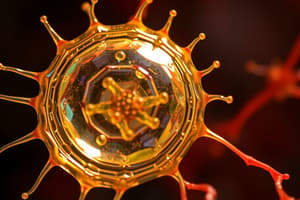Podcast
Questions and Answers
What is the primary function of cells in living organisms?
What is the primary function of cells in living organisms?
- To reproduce and ensure the continuation of species
- To evolve over time through the process of natural selection
- To respond to external stimuli
- To maintain homeostasis through metabolism (correct)
Which step in the scientific method involves proposing a hypothesis to explain a phenomenon?
Which step in the scientific method involves proposing a hypothesis to explain a phenomenon?
- Step 5: Predict
- Step 2: Ask a Question
- Step 6: Experiment
- Step 4: Hypothesize (correct)
What is the primary characteristic of living organisms that enables them to maintain a stable internal environment?
What is the primary characteristic of living organisms that enables them to maintain a stable internal environment?
- Metabolism
- Homeostasis (correct)
- Growth and Development
- Reproduction
Which scientific attitude is characterized by being open to new ideas and discoveries?
Which scientific attitude is characterized by being open to new ideas and discoveries?
What is the final step in the scientific method?
What is the final step in the scientific method?
Which characteristic of life is responsible for the diversity of species on Earth?
Which characteristic of life is responsible for the diversity of species on Earth?
What is the primary goal of the scientific method?
What is the primary goal of the scientific method?
Which scientific attitude is characterized by being unbiased and impartial?
Which scientific attitude is characterized by being unbiased and impartial?
What is the primary function of the experiment in the scientific method?
What is the primary function of the experiment in the scientific method?
Which characteristic of living organisms is responsible for their ability to respond to internal and external stimuli?
Which characteristic of living organisms is responsible for their ability to respond to internal and external stimuli?
Flashcards are hidden until you start studying
Study Notes
Characteristics of Life
- Organization: Living things are composed of cells, which are the basic structural and functional units of life.
- Metabolism: Living things carry out a series of chemical reactions to maintain homeostasis and sustain life.
- Homeostasis: Living things maintain a stable internal environment despite changes in the external environment.
- Growth and Development: Living things grow, develop, and change over time.
- Reproduction: Living things produce offspring to ensure the continuation of their species.
- Response to Stimuli: Living things respond to internal and external stimuli.
- Evolution: Living things change over time through the process of evolution.
Scientific Method
- Step 1: Make an Observation: Scientists observe the natural world and identify a problem or question.
- Step 2: Ask a Question: Scientists formulate a question based on their observation.
- Step 3: Research the Topic: Scientists gather information and research the topic to understand the context.
- Step 4: Hypothesize: Scientists propose a hypothesis to explain the phenomenon.
- Step 5: Predict: Scientists make predictions based on their hypothesis.
- Step 6: Experiment: Scientists design and conduct an experiment to test their hypothesis.
- Step 7: Analyze Data: Scientists analyze the data collected during the experiment.
- Step 8: Draw a Conclusion: Scientists draw a conclusion based on their analysis of the data.
- Step 9: Communicate Results: Scientists communicate their findings to others.
Scientific Attitudes
- Curiosity: Scientists are curious and open to new ideas and discoveries.
- Objectivity: Scientists strive to be objective and unbiased in their observations and conclusions.
- Skepticism: Scientists are skeptical of new information and test it against existing knowledge.
- Honesty: Scientists are honest and transparent in their research and reporting of results.
- Open-Mindedness: Scientists are open to changing their ideas and theories based on new evidence.
- Respect for Evidence: Scientists respect the evidence and let it guide their conclusions.
Scientific Theories
- Definition: A scientific theory is a well-substantiated explanation for a set of phenomena.
- Characteristics:
- Testable: Scientific theories can be tested and supported by evidence.
- Falsifiable: Scientific theories can be proven or disproven through experimentation.
- Predictive: Scientific theories can be used to make predictions about future events.
- Explanatory: Scientific theories provide a clear explanation for the phenomenon being studied.
- Examples: The theory of evolution, the theory of gravity, the atomic theory.
Characteristics of Life
- Living things are composed of cells, which are the basic structural and functional units of life.
- Metabolism involves a series of chemical reactions to maintain homeostasis and sustain life.
- Homeostasis is the ability to maintain a stable internal environment despite changes in the external environment.
- Growth and development involve changes in size, shape, and form over time.
- Reproduction involves producing offspring to ensure the continuation of a species.
- Living things respond to internal and external stimuli through various mechanisms.
- Evolution is the change in species over time through genetic variation and natural selection.
Scientific Method
- Scientists observe the natural world, identify problems, and formulate questions.
- Research involves gathering information to understand the context and background of the question.
- A hypothesis is a proposed explanation for a phenomenon, and it guides the experiment.
- Predictions are made based on the hypothesis, and the experiment is designed to test it.
- Data analysis involves examining the data collected during the experiment.
- A conclusion is drawn based on the analysis of the data, and results are communicated to others.
Scientific Attitudes
- Curiosity involves being open to new ideas and discoveries.
- Objectivity involves striving to be unbiased in observations and conclusions.
- Skepticism involves questioning new information and testing it against existing knowledge.
- Honesty involves transparency and accuracy in research and reporting results.
- Open-mindedness involves being willing to change ideas and theories based on new evidence.
- Respect for evidence involves letting evidence guide conclusions and inform decisions.
Scientific Theories
- A scientific theory is a well-substantiated explanation for a set of phenomena.
- Theories are testable, falsifiable, predictive, and explanatory.
- Examples of scientific theories include the theory of evolution, the theory of gravity, and the atomic theory.
Studying That Suits You
Use AI to generate personalized quizzes and flashcards to suit your learning preferences.




